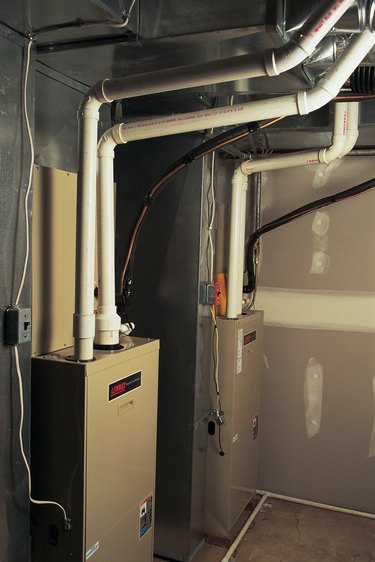
In the United States, 10 states and the District of Columbia require a license for boiler operators. Though most states don't require one, the Bureau of Labor Statistics recommends that all boiler operators be licensed. Because projected job growth in the boiler operator sector is expected to be slow over the next decade, any operators who have a license, as well as advanced training, will be more marketable.
Job Reponsibilities
Video of the Day
A boiler operator operates and maintains engines, boilers, burners or any other mechanical equipment required for heating, cooling and utility systems. He may have to monitor computer-generated reporting, charts and gauges. A boiler operator must maintain, service and repair equipment. Physical fitness, eye-hand coordination and manual dexterity are all skills required by the job.
Video of the Day
Skill Set
Because many generators, heating and cooling systems and turbines are computer monitored, the role of a boiler operator is limited to maintenance. Based on licensing and experience level, a boiler operator can be expected to utilize calculus and differential equations, electrical and electronic principles, metallurgy and properties of gases. A boiler operator should also have strong communication, verbal and written skills for management and report-generating responsibilities. This role might also require financial management and familiarity with occupational healthy and safety laws.
States With Licensing Requirements
The 10 states besides the District of Columbia that require boiler operators to have a license are Alaska, Arkansas, Iowa, Maine, Massachusetts, Minnesota, Montana, New Mexico, Ohio and Oklahoma. Each state has its own licensing requirements, levels and rules over reciprocity with other states. Many of the states that require a license do recognize out-of-state licenses, but only if the boiler operator has significant experience. The only exception is the state of Maine, which accepts out-of-state boiler operators who earned their license through the U.S. Coast Guard. As of 2011, Connecticut doesn't require a license, but that may change within the next decade.
Other Recommendations
If you've been through a boiler operator apprenticeship program, this should be just a stepping stone toward other credentials. Because the boiler operator field is competitive, it's professionally prudent to complete a four-year degree program -- one that emphasizes mechanics or mechanical engineering. Computer and mathematical skills are critical in this profession, since many heating and cooling systems are monitored by computer systems.
- Bureau of Labor Statistics: Stationary Engineers and Boiler Operators
- University of Missouri St. Louis: Occupational Outloook Handbook
- Iowa Workforce Information Network: Occupational Report for Stationary Engineers and Boiler Operators
- Boiler Operator License: Obtaining Boiler Operators Licenses
- State of Ohio: Boiler Operator License & Steam Engineer License
- Firemen-Engineers: Licenses
- Bureau of Labor Statistics: Occupational Employment and Wages, May 2010